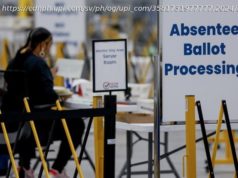The Senate is beginning debate on a $1.9 trillion COVID-19 relief bill, after Democrats made eleventh-hour changes aimed at ensuring they could pull President Joe Biden’s top legislative priority through the precariously divided chamber.
WASHINGTON (AP) — Democrats laid aside one battle over boosting the minimum wage but promptly descended into another internal fight Friday as the party haltingly tried moving its $1.9 trillion COVID-19 relief bill through the Senate. Hours after asserting they’d reached a deal between party moderates and progressives over renewing emergency unemployment benefits, lawmakers said Sen. Joe Manchin, D-W. Va., now preferred a less generous Republican version of the payments. Manchin is probably the chamber’s most conservative Democratic, and a kingmaker in a 50-50 Senate that leaves his party without a vote to spare. With Democrats’ scanty majorities — they have a mere 10-vote House edge — the party can’t tilt too far to the center without losing progressive support. The episode tossed fresh complications into the Democrats’ drive to give quick approval to a relief bill that is President Joe Biden’s top legislative goal. And while they still seemed likely to pass the package, the problem underscored the headaches confronting party leaders over the next two years as they try moving their agenda through Congress with such slender margins. “I don’t know where he is,” said No.2 Senate Democratic leader Richard Durbin of Illinois, when asked for Manchin’s latest stance on jobless benefits. Asked if Democrats could simply accept the GOP’s version, Durbin said, “We don’t want to. We want to get this wrapped up.” That was a reference to a need to move the overall relief bill once again through the House, which has a large numbers of liberal Democrats and approved an initial version of the legislation last weekend that the Senate has since changed. The relief legislation, aimed at battling the killer pandemic and nursing the staggered economy back to health, will provide direct payments of up to $1,400 to most Americans. There’s also money for COVID-19 vaccines and testing, aid to state and local governments, help for schools and the airline industry, tax breaks for lower-earners and families with children, and subsidies for health insurance.






